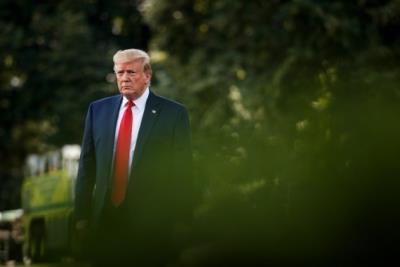Politics
Trump’s Policies Reshape U.S. Governance and Global Relations

Significant shifts in governance and international relations have characterized President Donald Trump’s administration, marked by the use of Executive Directives to address issues of bureaucratic corruption and economic imbalances. Critics argue that such measures undermine democratic processes, yet Trump maintains that his approach, encapsulated in his “America First” policy, is essential for revitalizing the economy and reducing the national debt, which currently stands at approximately $36 trillion.
Trump’s strategy has involved declaring national emergencies, such as those on immigration and trade, which he initiated in January and April of this year, respectively. The immigration directive has mobilized the U.S. Army to assist in border control, while the trade directive has enabled the imposition of tariffs aimed at protecting American workers and addressing perceived inequities in trade relationships. The Department of Homeland Security (DHS) has been actively engaged in these efforts, deploying teams to identify illegal migrants.
In terms of economic policy, Trump has introduced a 10 percent universal tariff on various trading partners, which has reportedly generated a budget surplus of $27 billion in June 2025 alone. This approach reflects a broader strategy to negotiate bilateral trade agreements and reduce reliance on multilateral frameworks, which he argues have not served American interests. Trump’s supporters claim these tariffs are a means of promoting responsible spending and reducing the national debt, while critics express concern over the potential long-term impact on global economic stability.
Impact on Global Relations
The implications of Trump’s policies extend beyond domestic borders, significantly impacting U.S. relations with key global players. Notably, Elon Musk, a former ally and head of the Department of Government Efficiency (DOGE), has emerged as one of Trump’s most vocal critics. The ongoing tensions between the U.S. and other nations, particularly regarding trade practices, highlight the shifting dynamics in international relations.
As the only remaining superpower, the U.S. continues to exert considerable influence over global economics and governance. However, the current geopolitical landscape is evolving, with countries like China actively seeking to establish themselves as major players. The fragmentation of the global trading system poses challenges to traditional U.S. dominance, prompting a reevaluation of foreign policy strategies.
Trump’s administration has also taken significant steps to withdraw from international organizations that he perceives as detrimental to U.S. interests. The withdrawal from the World Health Organization (WHO) earlier this year exemplifies this approach. On July 18, a joint statement from Marco Rubio, Secretary of State, and Robert F. Kennedy Jr., Secretary of Health, further rejected amendments proposed by the WHO, citing concerns over national sovereignty and the imposition of policies that could infringe on American freedoms.
India’s Position and Future Relations
For countries like India, the current U.S. administration presents both challenges and opportunities. As a significant global player, India must navigate its relationship with the U.S. carefully, ensuring its national interests remain paramount. The Indian government has expressed support for Trump’s efforts to curb illegal migration, reflecting a shared interest in regional stability.
Moving forward, India is encouraged to enhance its “Make in India” initiatives while fostering bilateral trade relationships that offer mutual benefits. The challenges posed by U.S. foreign policy, particularly in relation to Pakistan and China, necessitate a strategic approach to diplomatic negotiations.
As the global order becomes increasingly multipolar, India’s focus should remain on developing its domestic market, strengthening its international partnerships, and maintaining a non-aligned stance in geopolitical conflicts. The potential for collaboration between the U.S. and India exists, provided both nations recognize their shared democratic values and mutual interests in combating global threats like terrorism and international crime.
The evolving landscape of U.S. governance under Trump underscores the importance of adaptability for international partners. India, in particular, must continue to assert its sovereignty while engaging in constructive dialogue aimed at fostering long-term relationships with the U.S. and other nations.
-

 Business5 months ago
Business5 months agoKenvue Dismisses CEO Thibaut Mongon as Strategic Review Advances
-

 Lifestyle4 months ago
Lifestyle4 months agoHumanism Camp Engages 250 Youths in Summer Fest 2025
-

 Sports4 months ago
Sports4 months agoDe Minaur Triumphs at Washington Open After Thrilling Comeback
-

 Sports5 months ago
Sports5 months agoTupou and Daugunu Join First Nations Squad for Lions Clash
-

 Top Stories5 months ago
Top Stories5 months agoColombian Senator Miguel Uribe Shows Signs of Recovery After Attack
-

 World5 months ago
World5 months agoASEAN Gears Up for Historic Joint Meeting of Foreign and Economic Ministers
-

 Health4 months ago
Health4 months agoNew Study Challenges Assumptions About Aging and Inflammation
-

 Business5 months ago
Business5 months agoOil Prices Surge Following New EU Sanctions on Russia
-

 Entertainment4 months ago
Entertainment4 months agoDetaşe-Sabah Violin Ensemble Captivates at Gabala Music Festival
-

 Entertainment4 months ago
Entertainment4 months agoBaku Metro Extends Hours for Justin Timberlake Concert
-

 Top Stories5 months ago
Top Stories5 months agoRethinking Singapore’s F&B Regulations Amid Business Closures
-

 Business5 months ago
Business5 months agoU.S. House Approves Stablecoin Bill, Sends to Trump for Signature









